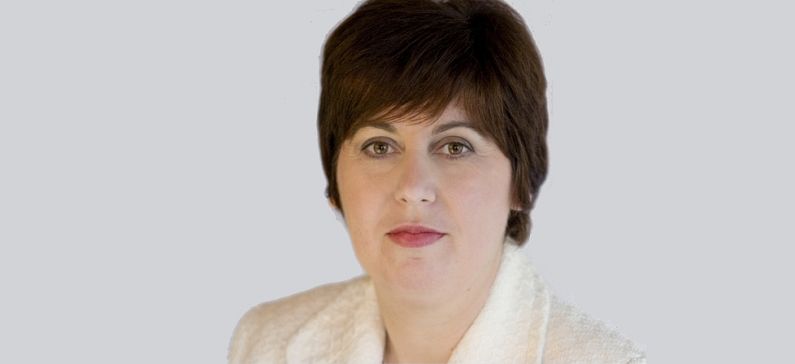
Where were you born?
I was born in Athens Greece, in the Academy of Plato neighborhood at the City Center. My parents were born in Athens too. My grandparents came from the Cyclades, the islands of Kythnos, and Andros.
What do you remember from your childhood?
I remember being a good student at school, being curious, visiting the public libraries and setting up experiments at home and at my friends’ houses (e.g. making simple electrochemical cells, or carrying our exothermal chemical reactions). I was also reciting poems, read speeches at events related to national and religious holidays, and sometimes read the prayer at the School Assembly.
Your current research interests are something you wanted to do since you were young? When did you decide to become involved with Nanomaterials?
It seems to me that I was always destined for science although my teachers in high school thought that I would be equally successful if I were to follow the path of philosophy. I was equally strong in the Language-Literature as in the Math-Physics-related disciplines. I had not heard of the materials science discipline until I tool a course on electron microscopy of materials of the late Professor Antonopoulos at the Aristotelio University in Thessaloniki.
You studied at Aristotelio University and the you continued abroad. Was that a difficult decision due to your field?
I was among the top performers from all over the Country (Greece) in my graduating class. I could have been admitted to any School and department in my discipline (Science and Engineering) and I had chosen the Physics Department in the Aristotelio University because I had read it had a nuclear reactor on site for use by the students. My plan was to follow nuclear physics –that was before the Chernobyl accident changed the prospects in that field (remember that I entered the University in Fall of 1986 just after that accident –only recently nuclear physics and reactors are gaining some renewed interest in the context of alternative energy).
Also, it was my interest to carry out postgraduate studies abroad and US was in my long-term plans but I had no guidance or information whatsoever as to how to apply for PhD studies in the US. Once I found out about Ceramic materials and electron microscopy I was utterly fascinated and I carried out my diploma thesis’ research on that subject matter. Then, I was recommended by my Professors (Siapkas and Antonopoulos) for a scholarship at the University of Liverpool at UK. Once I was granted the scholarship, I moved to the UK for postgraduate work. Following my PhD studies at the University of Birmingham under the advice of renowned electron microscopist M.H. Loretto I had two offers for post-doctoral studies from US Institutions. So, it was a natural path for my career development to live and work abroad. As much as I have been grateful to Greece for the free education and the opportunity to obtain my bachelor’s degree and to be exposed to emerging fields of science and engineering, it was the US that offered me the career opportunities and which allowed me to have a research home and a teaching position and now as a Full Professor of Materials Science and Engineering and the Director of the Center for Nanomaterials and Sensor Development, I have enjoyed the privilege of mentoring a large number of students who have set out to careers of their own. I have produced innovative research and publications and patents and device prototypes that are going to revolutionize personal diagnostics. Today I am a US Citizen and I am grateful for all that the US has offered to me and to my family.
Could you elaborate about your current positions?
My position is primarily Full Professor (with tenure) at the Department of Materials Science and Engineering at the State University of New York where I lead a group of post-docs , graduate, undergraduate students and high school interns and I am teaching courses related to my field of expertise. In this capacity I am overseeing and carrying out experiments, I am teaching regular academic courses and I give lectures to other Institutions and at Conferences and I travel the world over to present my research. The Center of Nanomaterials and Sensor Development was established with funds that I secured from the National Science Foundation, the primary sponsor of my research, and it is an interdisciplinary research Center where faculty from the various departments across campus (e.g. electrical engineering, pathology, biochemistry, etc) are working together to make novel nanostructured materials and novel devices related to nanomedicine. I am overseeing the grant writing process, the cross-cutting education of the research associates and the outreach facilities of the Center. Several science videos have been prepared by funding agencies (NSF science Nation) or media (TV globo) or research societies (IOP) that feature and highlight the activities of the Center.
Numerous reports in the media (mashable, Fox news, NPR, newsday) have also referred to the Center’s activities.
You have created innovative and successful programs for nanoscience, can you explain the functionality of your findings?
Our findings primarily involve novel nanostructured sensing elements for the detection of biomarkers (disease signaling molecules) in the breath of humans and animals that may indicate/signal the onset of a disease or metabolic malfunction. Thus, with a single exhale the individual may monitor for example the levels of nitric oxide (NO) in his/her breath to figure out if an asthma attack is impending and thus take medication as needed. Or monitoring the acetone levels in the breath allows the individual to check the insulin level in his/her blood non –invasively and with minimal effort.
How difficult was it to be as destinguished in your field?
I have been fortunate to be among the few scientists who dealt with nanotechnology early on. My background involving the atomic level characterization of materials using electron microscopy enabled me to identify differences in the structure of nano-scale metal oxides that were critical for the development of selective chemo sensors. It has really come down to understanding the phase (polymorph) of the material that is used for sensing and how this allows specific gas-oxide interactions -that led to the breakthroughs of my team. Next was the realization that you need just a single exhale to capture the gas of interest at the concentration of interest and we set out to making sensors and devices that do just that. And of course using inexpensive oxide technology and scalable nanomanufacturing will help to promote the technology further and making it available to everyone really.
You live abroad. Do you have in mind a return to Greece? If so under which conditions?
I was born and raised in Greece and my siblings and extended family and childhood and College friends still live there and of course one part of me will always go back to where I come from. The other part of me is my family here and my son who was born and is being raised here and US is his home and where he comes from. The bottom line is that my career is here, and my life has been my career for a long time now, so in a sense this is what is likely to guide my future too.
Do you think that Greece could be more present in your field?
Although I have spent time carrying out research in several countries all over the world (UK, Hungary, Italy, Switzerland, Cyprus, Brazil) and have visited Universities and Research Labs all over the world (Japan, Australia, Europe, Americas) I did not have a chance to interact with the Institutions in Greece for the last 24 years since my graduation from Thessaloniki. I have participated in conferences organized by Greek Institutions or held in Greece and I did co-organize an ECI conference in Crete a couple of years ago that was successful. Last year I was invited as an evaluator for the assessment of a Technological Institute in Greece but I do not have a comprehensive picture as to what is the state of materials science research in Greece. I believe that there are departments and programs dedicated to this discipline but I am not in a position to make specific recommendations as I am not fully aware of the performance of the existing programs. Certainly nanomedicine is a great field to address as this domain will demonstrate the first real applications of nanomaterials and Greek Institutions are traditionally strong in science, engineering and medicine. Merging these three fields may bring revolutionary changes with small investments in infrastructure.
During the last few years due to the economical crisis, we have the so called “brain drain” phenomenon.
I do not believe that there is a brain-drain in Greece. I believe that there are few opportunities for the good brains without means and contacts. A way to address this problem is to open new positions and to re-consider established practices. I remember starkly from my time as a student, although I was performing very well during each and every semester, I was never given the chance to apply for the Erasmus exchange program. I doubt that the ones who were sent were motivated enough to take advantage of and build on the opportunity.
This is what causes brain-drain. That limited opportunity is made available to the able and the highly motivated. There are many good people who do not wish to leave Greece. It is not everyone who is willing to make this sacrifice for his/her career and it is hard to be a stranger among strangers at times, especially at first. There are some who seek the opportunity to study, work and live abroad. We all deserve to have a choice to leave or stay to pursue our careers and this is the determining factor whether Greece take care of its scientists or not. And for many graduates the option to stay is simply not there.
How often do you visit Greece?
I try to visit Greece once a year; sometime is less often sometime is more often. I visit family in Athens and Thessaloniki and travel to some island for vacation.
What does Greece mean for you?
Like I mentioned above, what constitutes Greece for me is the childhood memories and the customs and experiences of my upbringing there. I have now lived longer abroad than in Greeece and I have committed to serve the US and I do so with pride. I am also proud to be a Greek-American and to carry the Hellenic legacy with me forever. Nothing can change that. I think of Greece with love and care and I wish to be of help to Greek people in any capacity that I can.
If you could address a question to all Greeks, what would it be?
Do they share the same love for Greece with those who have been deprived of it, in order to do the best for their country?
Invented a breath test that could detect diseases
Pelagia-Irene Gouma, also known as Perena Gouma, is a tenured Professor in the Department of Materials Science & Engineering at the State University of New York (SUNY) Stony Brook and also the Director of the Center for Nanomaterials and Sensor Development.
Her research focuses on selective chemical detectors, biosensors and hybrid nanoprobes for electronic olfaction systems and nanomedicine applications.
She was born in Athens. She received an M.S. degree in “Advanced Engineering Materials” from the Aristotelian University of Thessaloniki and continued her studies at the University of Liverpool and the University of Birmingham.
«I was born in Athens Greece, in the Academy of Plato neighborhood at the City Center. My parents were born in Athens too. My grandparents came from the Cyclades, the islands of Kythnos, and Andros» Gouma said in her interview at ellines.com.
During her tenure at Stony Brook, she established a new program on Sensor Nanotechnology and an Interdisciplinary Research Center (CNSD).
She also established novel and highly successful programs on nanomedicine, including developing and characterizing materials for biosensing applications suitable for non-invasive diagnostic purposes («band-aid»-type sweat test). Several patents have been granted and many others are currently pending. Her team invented a simple breath test that could sense when an asthma attack may strike.
On October 2, 2012, her team was selected to receive a three year National Science Foundation (NSF) award for the development of a personalized asthma monitor that uses nanotechnology to detect known airway inflammation biomarkers in the breath.
«Our findings primarily involve novel nanostructured sensing elements for the detection of biomarkers (disease signaling molecules) in the breath of humans and animals that may indicate/signal the onset of a disease or metabolic malfunction. Thus, with a single exhale the individual may monitor for example the levels of nitric oxide (NO) in his/her breath to figure out if an asthma attack is impending and thus take medication as needed» she added.
She holds Visiting Faculty positions in several universities of Japan, Italy and the USA.
INTERVIEW...
Where were you born?
I was born in Athens Greece, in the Academy of Plato neighborhood at the City Center. My parents were born in Athens too. My grandparents came from the Cyclades, the islands of Kythnos, and Andros.
What do you remember from your childhood?
I remember being a good student at school, being curious, visiting the public libraries and setting up experiments at home and at my friends’ houses (e.g. making simple electrochemical cells, or carrying our exothermal chemical reactions). I was also reciting poems, read speeches at events related to national and religious holidays, and sometimes read the prayer at the School Assembly.
Your current research interests are something you wanted to do since you were young? When did you decide to become involved with Nanomaterials?
It seems to me that I was always destined for science although my teachers in high school thought that I would be equally successful if I were to follow the path of philosophy. I was equally strong in the Language-Literature as in the Math-Physics-related disciplines. I had not heard of the materials science discipline until I tool a course on electron microscopy of materials of the late Professor Antonopoulos at the Aristotelio University in Thessaloniki.
You studied at Aristotelio University and the you continued abroad. Was that a difficult decision due to your field?
I was among the top performers from all over the Country (Greece) in my graduating class. I could have been admitted to any School and department in my discipline (Science and Engineering) and I had chosen the Physics Department in the Aristotelio University because I had read it had a nuclear reactor on site for use by the students. My plan was to follow nuclear physics –that was before the Chernobyl accident changed the prospects in that field (remember that I entered the University in Fall of 1986 just after that accident –only recently nuclear physics and reactors are gaining some renewed interest in the context of alternative energy).
Also, it was my interest to carry out postgraduate studies abroad and US was in my long-term plans but I had no guidance or information whatsoever as to how to apply for PhD studies in the US. Once I found out about Ceramic materials and electron microscopy I was utterly fascinated and I carried out my diploma thesis’ research on that subject matter. Then, I was recommended by my Professors (Siapkas and Antonopoulos) for a scholarship at the University of Liverpool at UK. Once I was granted the scholarship, I moved to the UK for postgraduate work. Following my PhD studies at the University of Birmingham under the advice of renowned electron microscopist M.H. Loretto I had two offers for post-doctoral studies from US Institutions. So, it was a natural path for my career development to live and work abroad. As much as I have been grateful to Greece for the free education and the opportunity to obtain my bachelor’s degree and to be exposed to emerging fields of science and engineering, it was the US that offered me the career opportunities and which allowed me to have a research home and a teaching position and now as a Full Professor of Materials Science and Engineering and the Director of the Center for Nanomaterials and Sensor Development, I have enjoyed the privilege of mentoring a large number of students who have set out to careers of their own. I have produced innovative research and publications and patents and device prototypes that are going to revolutionize personal diagnostics. Today I am a US Citizen and I am grateful for all that the US has offered to me and to my family.
Could you elaborate about your current positions?
My position is primarily Full Professor (with tenure) at the Department of Materials Science and Engineering at the State University of New York where I lead a group of post-docs , graduate, undergraduate students and high school interns and I am teaching courses related to my field of expertise. In this capacity I am overseeing and carrying out experiments, I am teaching regular academic courses and I give lectures to other Institutions and at Conferences and I travel the world over to present my research. The Center of Nanomaterials and Sensor Development was established with funds that I secured from the National Science Foundation, the primary sponsor of my research, and it is an interdisciplinary research Center where faculty from the various departments across campus (e.g. electrical engineering, pathology, biochemistry, etc) are working together to make novel nanostructured materials and novel devices related to nanomedicine. I am overseeing the grant writing process, the cross-cutting education of the research associates and the outreach facilities of the Center. Several science videos have been prepared by funding agencies (NSF science Nation) or media (TV globo) or research societies (IOP) that feature and highlight the activities of the Center.
Numerous reports in the media (mashable, Fox news, NPR, newsday) have also referred to the Center’s activities.
You have created innovative and successful programs for nanoscience, can you explain the functionality of your findings?
Our findings primarily involve novel nanostructured sensing elements for the detection of biomarkers (disease signaling molecules) in the breath of humans and animals that may indicate/signal the onset of a disease or metabolic malfunction. Thus, with a single exhale the individual may monitor for example the levels of nitric oxide (NO) in his/her breath to figure out if an asthma attack is impending and thus take medication as needed. Or monitoring the acetone levels in the breath allows the individual to check the insulin level in his/her blood non –invasively and with minimal effort.
How difficult was it to be as destinguished in your field?
I have been fortunate to be among the few scientists who dealt with nanotechnology early on. My background involving the atomic level characterization of materials using electron microscopy enabled me to identify differences in the structure of nano-scale metal oxides that were critical for the development of selective chemo sensors. It has really come down to understanding the phase (polymorph) of the material that is used for sensing and how this allows specific gas-oxide interactions -that led to the breakthroughs of my team. Next was the realization that you need just a single exhale to capture the gas of interest at the concentration of interest and we set out to making sensors and devices that do just that. And of course using inexpensive oxide technology and scalable nanomanufacturing will help to promote the technology further and making it available to everyone really.
You live abroad. Do you have in mind a return to Greece? If so under which conditions?
I was born and raised in Greece and my siblings and extended family and childhood and College friends still live there and of course one part of me will always go back to where I come from. The other part of me is my family here and my son who was born and is being raised here and US is his home and where he comes from. The bottom line is that my career is here, and my life has been my career for a long time now, so in a sense this is what is likely to guide my future too.
Do you think that Greece could be more present in your field?
Although I have spent time carrying out research in several countries all over the world (UK, Hungary, Italy, Switzerland, Cyprus, Brazil) and have visited Universities and Research Labs all over the world (Japan, Australia, Europe, Americas) I did not have a chance to interact with the Institutions in Greece for the last 24 years since my graduation from Thessaloniki. I have participated in conferences organized by Greek Institutions or held in Greece and I did co-organize an ECI conference in Crete a couple of years ago that was successful. Last year I was invited as an evaluator for the assessment of a Technological Institute in Greece but I do not have a comprehensive picture as to what is the state of materials science research in Greece. I believe that there are departments and programs dedicated to this discipline but I am not in a position to make specific recommendations as I am not fully aware of the performance of the existing programs. Certainly nanomedicine is a great field to address as this domain will demonstrate the first real applications of nanomaterials and Greek Institutions are traditionally strong in science, engineering and medicine. Merging these three fields may bring revolutionary changes with small investments in infrastructure.
During the last few years due to the economical crisis, we have the so called “brain drain” phenomenon.
I do not believe that there is a brain-drain in Greece. I believe that there are few opportunities for the good brains without means and contacts. A way to address this problem is to open new positions and to re-consider established practices. I remember starkly from my time as a student, although I was performing very well during each and every semester, I was never given the chance to apply for the Erasmus exchange program. I doubt that the ones who were sent were motivated enough to take advantage of and build on the opportunity.
This is what causes brain-drain. That limited opportunity is made available to the able and the highly motivated. There are many good people who do not wish to leave Greece. It is not everyone who is willing to make this sacrifice for his/her career and it is hard to be a stranger among strangers at times, especially at first. There are some who seek the opportunity to study, work and live abroad. We all deserve to have a choice to leave or stay to pursue our careers and this is the determining factor whether Greece take care of its scientists or not. And for many graduates the option to stay is simply not there.
How often do you visit Greece?
I try to visit Greece once a year; sometime is less often sometime is more often. I visit family in Athens and Thessaloniki and travel to some island for vacation.
What does Greece mean for you?
Like I mentioned above, what constitutes Greece for me is the childhood memories and the customs and experiences of my upbringing there. I have now lived longer abroad than in Greeece and I have committed to serve the US and I do so with pride. I am also proud to be a Greek-American and to carry the Hellenic legacy with me forever. Nothing can change that. I think of Greece with love and care and I wish to be of help to Greek people in any capacity that I can.
If you could address a question to all Greeks, what would it be?
Do they share the same love for Greece with those who have been deprived of it, in order to do the best for their country?




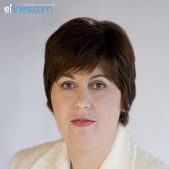
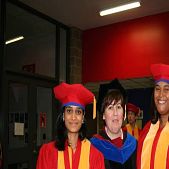
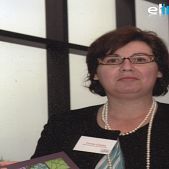
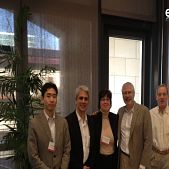
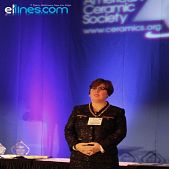
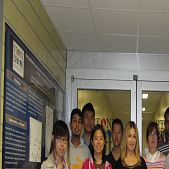
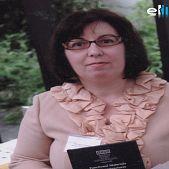







Τάκης Γεωργακόπουλος, Πνευμονολόγος
-09/08/2015 5:49 pm
Αποτελεί πρωτοποριακή ενέργεια
Χρόνια τώρα προσπαθούμε να ανιχνεύσουμε τι πάθhση κρύβει κάποιος, από το περιεχόμενο των αερίων που εμπεριέχει ο εκπνεόμενος αέρας.
Το έχουμε καταφέρει μετρώντας αέρια, σε συμπύκνωμα αέρα εκπνοής αλλά όχι σε αέρα εκπνεόμενο real-time.
Σίγουρα θα αποτελέσει ”νέο δρόμο” στην θεραπευτική πολλών παθήσεων που θα εκφράζονται μέσω του αναπνευστικού συστήματος.